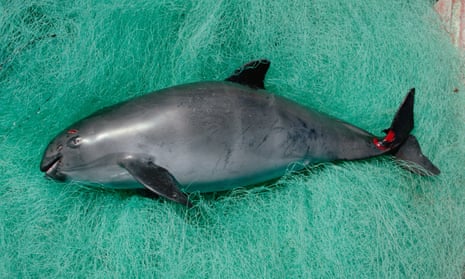The Sea Shepherd environmental group has published video showing an attack by about two dozen small fishing boats on the group’s vessel Farley Mowat in Mexico’s Gulf of California.
The fishermen in the Gulf, also known as the Sea of Cortez, oppose environmentalists trying to protect the vaquita marina, the world’s smallest and most endangered porpoise.
Sea Shepherd says fishermen threw lead weights, dead fish and even Tabasco sauce at the Farley Mowat and tried to douse the vessel and waters around it with gasoline in the attack on Wednesday.
🚨#BREAKINGNEWS🚨
— Sea Shepherd SSCS (@SeaShepherdSSCS) January 10, 2019
The @MVFarleyMowat IS UNDER ATTACK!
The Sea Shepherd vessel @MVFarleyMowat was prop fouled and boarded by angry poachers!
Read more Here: https://t.co/0JWQ5PwVXT#SeaShepherd #Mexico #ocean #vaquita #conservation pic.twitter.com/Ebw0QYTYFr
The video shows some of the fishing boats carried gill nets, though they are banned within the reserve designed to protect the vaquita.
The vaquita is nearing extinction due to gill nets set illegally to catch totoaba, a fish whose swim bladder commands astronomical prices because it is considered a delicacy in China.
Some fishermen threw a net in front of the Farley Mowat to foul the propellers of the Sea Shepherd vessel; others boarded the ship and apparently carried off some items.
The Farley Mowat’s crew can be seen using a hose to repel some of the smaller boats.
Sea Shepherd operates in the Gulf with the knowledge and cooperation of the Mexican government to help detect illegal nets.
The incident took place in an area set aside as a vaquita refuge in the Upper Gulf of California. Sea Shepherd said dozens of boats were taking part in “obvious illegal poaching” of totoaba.
The use of gill nets is banned within the reserve due to the impact upon the vaquita, a species of porpoise endemic to the Gulf of California.
Experts say as few as 15 of the marine mammals remain in the Gulf, the only place they exist, and none have ever been held in captivity.
Vaquita were only discovered in 1958 but now face imminent extinction. The remoteness of the Gulf of California make it difficult to police illegal fishing, prompting the intervention of Sea Shepherd.
The environmental organization, best known for its confrontations with Japanese whalers in the Southern Ocean, was founded in 1977 and has a fleet of boats it uses to observe and protest against whaling and illegal fishing.
Scientists have called on Mexican environmental officials to ban possession of the nets in the whole area, as well as carry out land patrols and inspections of boats setting out to sea to enforce the ban. At present, authorities patrol the area but poachers often flee in high-powered boats and make it to shore.
A voyage by researchers in late September sighted six or seven of the creatures, including a mother with a new calf. The sightings suggested that most of the remaining vaquitas have gathered in a roughly a 12- by 25-mile (20 by 40km) rectangle, a small enough area that it could potentially by protected by floating barriers to keep out the small boats used by poachers.
